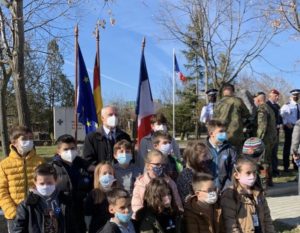59 VJET MË PARË TRAKTATI ELYSEE VULOSI PAJTIMIN FRANKO-GJERMAN: NJË BURIM FRYMËZIMI PËR SERBINË DHE KOSOVËN
NGA AMBASADORJA MARIE-CHRISTINE BUTEL DHE AMBASADORI JÖRN ROHDE
Më 22 janar 2022, ne festojmë përvjetorin e traktatit Elysée midis Francës dhe Gjermanisë, si gur themeli i pajtimit dhe paqes së sotme franko-gjermane, pasi dy vendet tona kishin qenë në luftë tre herë brenda 70 vjetëve – luftëra që shkaktuan miliona vdekje nga të dyja anët. Më pak se 20 vjet pas Luftës së Dytë Botërore, udhëheqësit politikë francezë dhe gjermanë – nën udhëheqjen e Presidentit De Gaulle dhe Kancelarit Adenauer – treguan një përkushtim të palodhshëm për të mbyllur faqen më të errët të historisë së tyre të përbashkët dhe nënshkruarnnjë traktat i orientuar vendosmêrisht drejt së ardhmes, duke u fokusuar në një të ardhme më të mirë të përbashkët për brezat e ardhshëm.
Ky traktat mundësoi për shembull themelimin e Zyrës së Rinisë Franko-Gjermane (OFAJ / DFJW). Traktati i Elysée-së vuri gjithashtu themelet e partneritetit të ngushtë franko-gjerman dhe projektit evropian që ne kemi ndërtuar së bashku me miqtë tanë evropianë që nga viti 1951. Kjo na mundësoi të garantonim një paqe të qëndrueshme dhe një prosperitet të përbashkët brenda Evropës. Paqja dhe prosperiteti lindën nga vullneti i pushtetarëve dhe popujve të Evropës për të tejkaluar tragjeditë e fundit të historisë sonë.
Sot gjejmë frymëzim në historinë e Francës dhe Gjermanisë dhe në pajtimin e suksesshëm të popujve tanë edhe për angazhimin tonë në Kosovë dhe në Ballkanin Perëndimor. Të aspirosh për anëtarësim në Bashkimin Evropian do të thotë gjithashtu të integrosh këtë dimension të ndërtimit evropian. Bashkimi Evropian nuk do të mund të ishte ndërtuar pa vullnetin e popujve për të jetuar së bashku.
Ky është frymëzimi për mbështetjen tonë të vazhdueshme në favor të Zyrës Rajonale të Bashkëpunimit Rinor (RYCO) në Ballkanin Perëndimor. Për të tashmen dhe të ardhmen, është thelbësore që të rinjtë të njihen me njëri-tjetrin, që klishetë dhe paragjykimet aktuale të dekonstruktohen dhe që të rinjtë e të gjitha prejardhjeve të përvetësojnë shijen dhe zakonin e shkëmbimit, bisedës me njëri-tjetrin, punës së bashku, duke jetuar kështu së bashku në këtë rajon në zemër të Evropës.
Ky frymëzim është edhe arsyeja pse ne kemi mbështetur integrimin rajonal në Ballkanin Perëndimor, për shembull, përmes zbatimit të tregut të përbashkët rajonal, Procesit të Berlinit dhe zotimeve të miratuara në Sofje. Bashkëpunimi rajonal është thelbësor për rritjen ekonomike të rajonit, e cila është thelbësore për të garantuar stabilitetin afatgjatë dhe për t’u ofruar të rinjve perspektiva dhe mundësi në këtë rajon.
Ky integrim rajonal është, siç e dimë ne francezët dhe gjermanët, njekohësisht një arsye dhe një përfitim i pajtimit. Është një rreth virtuoz që fillon sapo të jenë hedhur hapat e parë – të vështirë. Prandaj, jemi të bindur se do të ishte gabim të mendohet se status quo-ja aktuale ndërmjet Kosovës dhe Serbisë është e mirë për këdo. Është një sklerozë dhe një pengesë për zhvillimin e të dy vendeve, një rrezik jostabiliteti për rajonin dhe për Evropën në tërësi.
Kosova dhe Serbia janë Evropë, Ballkani Perëndimor është në zemër të saj. Bashkimi Evropian dhe shtetet anëtare të tij, në ballë të të cilave janë Franca dhe Gjermania, ofrojnë mbështetje të fuqishme për Kosovën dhe Serbinë, të cilat janë të destinuara të integrohen në Bashkimin tonë.
Kështu që sot ftojmë Kosovën dhe Serbinë që të marrin këtë frymëzim për t’u angazhuar plotësisht në dialogun e lehtësuar nga BE-ja dhe Përfaqësuesi i Posaçëm, Miroslav Lajčák. Kjo është rruga më e mirë drejt paqes, prosperitetit dhe drejt BE-së. Pikërisht në këtë dialog duhet të bëhen propozime konstruktive, të cilat ruajnë të ardhmen dhe interesat reciproke të të dy vendeve, si dhe të qytetarëve të të dyja vendeve. Sepse, përmes këtij dialogu mund të ndërtohet besimi me respekt për njëri-tjetrin dhe për marrëveshjet e kaluara dhe të ardhshme.
Franca dhe Gjermania do të vazhdojnë të jenë aty për të mbështetur dialogun ndërmjet Kosovës dhe Serbisë, si dhe të gjitha reformat që i afrojnë të dyja vendet drejt integrimit evropian, në të mirë të demokracisë dhe të gjithë qytetarëve evropianë.

Media Release
Franco-German Op-Ed: 59 YEARS AGO, THE ELYSEE TREATY SEALED THE FRANCO-GERMAN RECONCILIATION:
A SOURCE OF INSPIRATION FOR SERBIA AND KOSOVO
BY AMBASSADOR MARIE-CHRISTINE BUTEL AND AMBASSADOR JÖRN ROHDE
On 22 January 2022, we celebrate the anniversary of the Élysée treaty between France and Germany, as the cornerstone of today’s Franco-German reconciliation and peace, after our two countries had been at war three times within 70 years. Wars that caused millions of deaths on both sides. Less than 20 years after World War II, French and German political leaders – at the forefront were President De Gaulle and Chancellor Adenauer – showed an unfailing commitment to turn the darkest page of their common history and signed a treaty which resolutely steered us towards the future by focusing on a better joint future for the next generations.
This treaty created for instance the Franco-German Youth office (OFAJ / DFJW). The Elysée treaty also laid the foundations of the close Franco-German partnership and the European project that we have built together with our European friends since 1951. This enabled us to guarantee a sustainable peace and a shared prosperity within Europe. Peace and prosperity were born of the will of the rulers and peoples of Europe to overcome the recent tragedies of our history.
Today we find inspiration in the history of France and Germany and in the successful reconciliation of our peoples also for our engagement in Kosovo and in the Western Balkans. To yearn for joining the European Union also means to comprehend this dimension of the European construction. The European Union could not have been built without the willingness of the peoples to live together.
This is the inspiration for our constant support in favour of the Regional Youth Cooperation Office (RYCO) in the Western Balkans. For the present and the future, it is essential that young people get to know each other, that current clichés and prejudices are deconstructed and that young people of all backgrounds get the taste for and the habit of exchanging, talking to each other, working together and living together in this region at the heart of Europe.
This inspiration is also why we have supported regional integration in the Western Balkans through, for example, the implementation of the regional common market, the Berlin Process and the commitments adopted in Sofia. Regional cooperation is essential for economic growth of the region which is essential to guarantee stability on the long run and to offer young people prospects and opportunities in this region.
This regional integration is, as we French and Germans know, both a reason for and a benefit of reconciliation. It is a virtuous circle that begins once the first – difficult – steps have been taken. Therefore, we are convinced that it would be a mistake to think that the current status quo between Kosovo and Serbia is good for anyone. It is a sclerosis and an obstacle for the development of both countries, a risk of instability for the region and for Europe as a whole.
Kosovo and Serbia are Europe, the Western Balkans are at its heart. The European Union and its Member States, at the forefront of which are France and Germany, offer strong support to Kosovo and Serbia, which are destined to integrate into our Union.
So today we invite Kosovo and Serbia to use this inspiration to fully engage in the dialogue facilitated by the EU and Special Representative Miroslav Lajčák. This is the best path to peace, prosperity and towards the EU. It is in this dialogue that constructive proposals must be made, which preserve the future and the mutual interests of both countries, as well as of the citizens of both countries. It is through this dialogue that trust can be built, with respect for each other and for past and future agreements.
France and Germany will continue to be there to support the dialogue between Kosovo and Serbia as well as all the reforms that bring both countries closer to European integration, for the benefit of democracy and all European citizens.
_____________________
Information for the media
For more information, please contact: pr-11@pris.diplo.de
IL Y A 59 ANS, LE TRAITÉ DE L’ELYSÉE SCELLAIT LA RÉCONCILIATION FRANCO-ALLEMANDE : UNE SOURCE D’INSPIRATION POUR LA SERBIE ET LE KOSOVO
PAR L’AMBASSADRICE MARIE-CHRISTINE BUTEL ET L’AMBASSADEUR JÖRN ROHDE
Nous célébrons le 22 janvier 2022, l’anniversaire du traité de l’Élysée entre la France et l’Allemagne, pierre angulaire de la réconciliation franco-allemande et de la paix, après que nos deux pays ont été en guerre par trois fois en 70 ans, engendrant plusieurs millions de morts. Moins de 20 ans après la seconde guerre mondiale, il a fallu que les responsables politiques français et allemands, au premier rang desquels le Président De Gaulle et le Chancelier Adenauer, fassent preuve d’une volonté sans faille pour décider de tourner la page la plus sombre de leur histoire commune et signer un traité résolument tourné vers l’avenir qui assure aux générations futures un meilleur avenir commun.
Le traité de l’Elysée crée par exemple l’Office franco-allemand pour la Jeunesse (OFAJ / DFJW) et jette plus largement les bases du partenariat étroit entre la France et l’Allemagne, ainsi que du projet européen que nous avons co-construit avec nos amis européens depuis 1951. Ce projet qui nous a permis de garantir une paix durable et une prospérité partagée en Europe ; paix et prospérité nées de la volonté des gouvernants et des peuples européens de dépasser les drames récents de notre Histoire.
Aujourd’hui, l’histoire de la France et de l’Allemagne et la réconciliation dont ont su faire preuve nos peuples restent une source d’inspiration qui guide notre engagement au Kosovo et dans les Balkans occidentaux. Aspirer à rejoindre l’Union européenne, c’est aussi intégrer cette dimension de la construction européenne. L’Union européenne n’aurait pu être bâtie sans la volonté des peuples de vivre ensemble.
C’est tout le sens du soutien constant que nous apportons au Regional Youth Cooperation Office (RYCO) dans la région. Pour le présent et pour l’avenir, il est indispensable que les jeunes de tous horizons apprennent à se connaître, que les clichés et préjugés qui existent soient déconstruits et que soient pris le goût et l’habitude d’échanger, de se parler, de travailler ensemble et de vivre ensemble dans cette région du cœur de l’Europe.
C’est aussi la raison de notre soutien à l’intégration régionale dans les Balkans occidentaux, notamment par la mise en place du marché commun régional, le processus de Berlin et les engagements adoptés à Sofia. La coopération régionale est indispensable au développement économique, seul à même de garantir durablement la stabilité et d’offrir à la jeunesse des perspectives dans la région.
Cette intégration régionale est, nous le savons comme Français et Allemands, à la fois une raison et un bénéfice de la réconciliation. C’est un cercle vertueux qui s’enclenche une fois les premiers pas – difficiles – effectués. C’est pourquoi nous sommes convaincus que ce serait une erreur de penser que le statu quo actuel entre le Kosovo et la Serbie bénéficie à quiconque. C’est une sclérose et un obstacle pour le développement des deux pays, un risque d’instabilité pour la région et pour l’Europe dans son ensemble.
Le Kosovo et la Serbie, c’est l’Europe, les Balkans occidentaux en sont au cœur. L’Union européenne et ses Etats membres, au premier rang desquels la France et l’Allemagne, offrent un soutien appuyé au Kosovo et à la Serbie qui ont vocation à intégrer à terme notre Union.
Nous appelons donc ici le Kosovo et la Serbie à voir dans notre expérience passée une inspiration pour s’engager pleinement dans le dialogue facilité par l’UE et son représentant spécial Miroslav Lajčák. C’est le meilleur chemin vers la paix, la prospérité et l’UE. C’est dans ce dialogue qu’il faut faire des propositions constructives, qui préservent l’avenir et les intérêts mutuels des deux pays, ainsi que de ceux qui y vivent. C’est à travers ce dialogue que pourra se construire la confiance, dans le respect de l’autre et des accords passés et à venir.
La France et l’Allemagne continueront de répondre présents et de soutenir autant que nécessaire le dialogue entre le Kosovo et la Serbie, ainsi que toutes les réformes qui rapprochent ces deux pays de l’intégration européenne, pour le bénéfice de la démocratie et de tous les citoyens européens.



